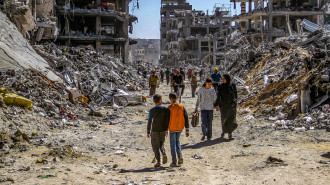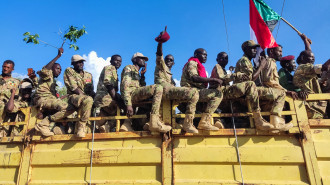Sudan threatens South Sudan with possible invasion
Sudan threatens South Sudan with possible invasion
Tensions escalate over armed groups accused of operating from South Sudan in the north, ahead of peace negotiations in the civil war in Juba.
4 min read
South Sudan has been ravaged by civil war since December 2013 [AFP]
Sudan has raised fresh tensions with South Sudan [Ar], threatening to pursue armed movements believed to be active in the north's Darfur, Blue Nile and Kordofan regions while reportedly taking orders from Juba.
The threat is the first of its kind since the civil war began a year ago in South Sudan. War broke out in December 2013 after then Vice-President Riek Machar ended his alliance with President Salva Kiir Mayardit. Sudan has taken a relatively conciliatory position towards its southern neighbour over the past year, despite South Sudan repeatedly accusing Khartoum of supporting Machar.
The Sudanese foreign ministry has now asked the South Sudanese government in Juba to stop harbouring anti-Khartoum groups, insisting that the interests of both countries would be served by mutual stability.
Khartoum has accused Juba of supporting armed groups including the Sudan People's Liberation Movement-North (SPLM-N), which was part of the ruling party in the South before its secession; and the Justice and Equality Movement (JEM), headed by Gibril Ibrahim, which is fighting the central Sudanese government in Darfur.
JEM had reportedly been supported by Libya under Gaddafi, as well as Chad - until its recent reconciliation with Sudan. Both sources of support are now reported to have dried up.
Taking the fight to Juba
The Sudanese foreign ministry has claimed it has verified information Juba is continuing to provide logistical and financial support to anti-Khartoum armed groups operating on Sudanese soil. It demanded South Sudan respects its commitment to stop supporting such groups.
"The government has been very patient with South Sudan while it harbours rebels within its borders that are trying to destabilise Sudan," said Muhammad Atta, director of Sudan's National Intelligence and Security Services (NISS).
"The time has come to pursue the rebels in any location," hge added, indicating Khartoum might be willing to invade South Sudan, where northern officials say the groups are based.
Sudanese president Omar al-Bashir described the rebels as "mercenaries who fight for money", and accused them on Saturday of fighting alongside Juba's government against Riek Machar.
The final frontier
The joint Sudanese-South Sudanese committee tasked with drawing the border between the two countries, was unable to reach an agreement on the border zone and crossings when it met last week.
Khartoum set defining the border as a prerequisite to implementing a cooperation agreement signed by the two countries in Addis Ababa in September 2012, to ensure border security and limit rebel movement between the countries.
Khartoum accused Juba of delaying a final demarcation of the border after the joint committee confirmed that agreement had yet to be reached over 80 percent of the frontier. In addition, discussions over the status of five areas have been postponed, to avoid holding up the committee's work.
Khartoum's escalation comes at a time when warring factions in South Sudan are heading towards peace talks to end the civil war.
Sudan may be taking advantage of instability in South Sudan to take decisive action against rebel groups based there before warring South Sudanese sides reach an agreement.
The drums of war
The Sudanese government believes striking the logistical bases of rebel groups will weaken them and cut off the supply of fighters, making it easier to defeat them.
Observers believe Khartoum is trying to thwart regional and international efforts to pressure it into making further political concessions.
This is deemed especially important as Sadiq al-Mahdi, leader of the opposition National Umma party, has been gaining regional and international support.
The Sudanese government is aware of Mahdi's political ambitions. Mahdi was prime minister from 1986 to 1989, before his government was toppled by the June 1989 coup that brought the current regime to power. He insists he remains the last elected Sudanese prime minister.
Political analyst Maher Abu al-Joukh said the government's threats were preparing the way for military operations inside South Sudan.
"Khartoum believes any change in South Sudan in the upcoming period will only complicate its mission," he said.
"Khartoum fears Juba will continue to use armed groups to pressure Sudan after it resolves its civil war."
Abu al-Joukh stressed the dangers of Sudan's threats, which are likely to "put the country on a collision course with the international community, which sees an attack on another country's territory an act of aggression".
This article is an edited translation from our Arabic edition.
The threat is the first of its kind since the civil war began a year ago in South Sudan. War broke out in December 2013 after then Vice-President Riek Machar ended his alliance with President Salva Kiir Mayardit. Sudan has taken a relatively conciliatory position towards its southern neighbour over the past year, despite South Sudan repeatedly accusing Khartoum of supporting Machar.
The Sudanese foreign ministry has now asked the South Sudanese government in Juba to stop harbouring anti-Khartoum groups, insisting that the interests of both countries would be served by mutual stability.
| South Sudan has repeatedly accusing Sudan of supporting Riek Machar. |
Khartoum has accused Juba of supporting armed groups including the Sudan People's Liberation Movement-North (SPLM-N), which was part of the ruling party in the South before its secession; and the Justice and Equality Movement (JEM), headed by Gibril Ibrahim, which is fighting the central Sudanese government in Darfur.
JEM had reportedly been supported by Libya under Gaddafi, as well as Chad - until its recent reconciliation with Sudan. Both sources of support are now reported to have dried up.
Taking the fight to Juba
The Sudanese foreign ministry has claimed it has verified information Juba is continuing to provide logistical and financial support to anti-Khartoum armed groups operating on Sudanese soil. It demanded South Sudan respects its commitment to stop supporting such groups.
"The government has been very patient with South Sudan while it harbours rebels within its borders that are trying to destabilise Sudan," said Muhammad Atta, director of Sudan's National Intelligence and Security Services (NISS).
"The time has come to pursue the rebels in any location," hge added, indicating Khartoum might be willing to invade South Sudan, where northern officials say the groups are based.
Sudanese president Omar al-Bashir described the rebels as "mercenaries who fight for money", and accused them on Saturday of fighting alongside Juba's government against Riek Machar.
The final frontier
The joint Sudanese-South Sudanese committee tasked with drawing the border between the two countries, was unable to reach an agreement on the border zone and crossings when it met last week.
Khartoum set defining the border as a prerequisite to implementing a cooperation agreement signed by the two countries in Addis Ababa in September 2012, to ensure border security and limit rebel movement between the countries.
Khartoum accused Juba of delaying a final demarcation of the border after the joint committee confirmed that agreement had yet to be reached over 80 percent of the frontier. In addition, discussions over the status of five areas have been postponed, to avoid holding up the committee's work.
Khartoum's escalation comes at a time when warring factions in South Sudan are heading towards peace talks to end the civil war.
Sudan may be taking advantage of instability in South Sudan to take decisive action against rebel groups based there before warring South Sudanese sides reach an agreement.
The drums of war
The Sudanese government believes striking the logistical bases of rebel groups will weaken them and cut off the supply of fighters, making it easier to defeat them.
| Warring factions in South Sudan are heading towards peace talks to end the civil war. |
Observers believe Khartoum is trying to thwart regional and international efforts to pressure it into making further political concessions.
This is deemed especially important as Sadiq al-Mahdi, leader of the opposition National Umma party, has been gaining regional and international support.
The Sudanese government is aware of Mahdi's political ambitions. Mahdi was prime minister from 1986 to 1989, before his government was toppled by the June 1989 coup that brought the current regime to power. He insists he remains the last elected Sudanese prime minister.
Political analyst Maher Abu al-Joukh said the government's threats were preparing the way for military operations inside South Sudan.
"Khartoum believes any change in South Sudan in the upcoming period will only complicate its mission," he said.
"Khartoum fears Juba will continue to use armed groups to pressure Sudan after it resolves its civil war."
Abu al-Joukh stressed the dangers of Sudan's threats, which are likely to "put the country on a collision course with the international community, which sees an attack on another country's territory an act of aggression".
This article is an edited translation from our Arabic edition.





 Follow the Middle East's top stories in English at The New Arab on Google News
Follow the Middle East's top stories in English at The New Arab on Google News


